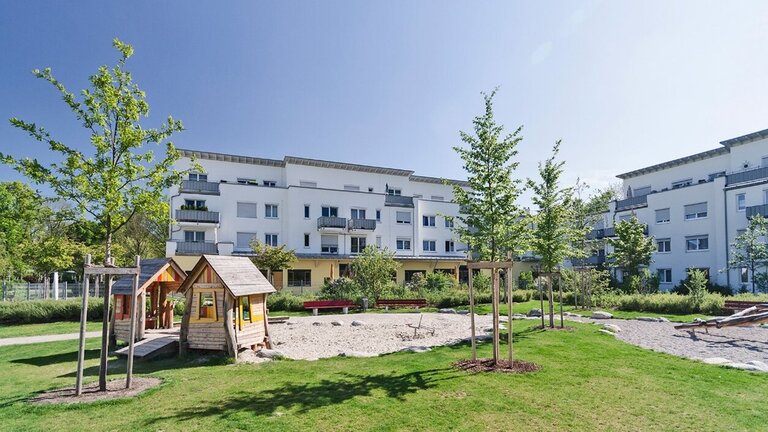Munich, Germany, April 19, 2022. The stock of buildings owned by the nonprofit housing company Katholisches Siedlungswerk München GmbH (KSWM) includes more than 3,000 apartments, 17 percent of which are publicly subsidized. This extensive portfolio of buildings is now to be modernized to meet all requirements relating to climate change and energy efficiency. This poses a major challenge for KSWM as the properties differ with regard to age and need for renovation. Drees & Sommer SE, a Stuttgart-based consulting company specializing in construction and real estate, is assisting the housing organization with a newly developed Climate Roadmap. This describes a detailed route towards developing housing stock with eco-friendly credentials. The plan was adopted on 24 March 2022.
In the buildings sector, residential buildings account for 35 percent of CO2 emissions. Of this percentage, buildings constructed before 1979 are responsible for two-thirds of emissions. This means that real estate companies have a responsibility to significantly reduce the amount of energy their buildings consume, and to take appropriate action to renovate them. If the real estate portfolio includes thousands of properties, each in a different condition, as is the case with KSWM, this raises complex issues. ‘In our new building projects, we have long taken heed of sustainable and climate-friendly construction methods. As a result, we increasingly focus on using renewable raw materials, while reducing the pressure on the environment by ensuring high energy efficiency. Yet the transition to a climate-compatible economy in Germany can only succeed if the existing housing stock is upgraded with a view to the future, and residents’ quality of life is also raised. This renovation work will be a task spanning decades,’ explains Stefan Geissler, Managing Director at Katholisches Siedlungswerk München GmbH. For example, the residential complex under construction in Grafing is a pilot project for timber construction and sustainability. The new residential units ensure that they are operating efficiently by using energy-efficient heating systems and innovative heat pumps.
Thinking of the Distant Future
KSWM brought the experts from Drees & Sommer on board for the ambitious renovation project. The team developed a detailed action plan, known as the Climate Roadmap. This shows how the housing organization can reduce the CO2 emissions of its building stock to almost zero by 2050. ‘The Climate Roadmap provides a well-founded guide on how we can reconcile all aspects when developing climate-compatible building stock. It is a highly complex computational and optimization task.’, says Moritz-Andreas Decker, expert in carbon neutrality and energy management at Drees & Sommer. After an initial inventory, the energy figures for the last three years were analyzed. In addition to the individual building and residential units, the consultants also looked closely at energy-related district solutions. ‘Over the long term, the investment in renovation pays off because the Climate Roadmap delivers savings during operation if the appropriate steps are taken, thus preserving the value of the properties. It also avoids bad investments resulting in retrofits, or expensive conversion work due to regulatory orders,’ comments Markus Claudy, Drees & Sommer’s specialist for decarbonization and energy optimization issues.
New Is Good, But Renewable Is Better
Heating systems are one of the biggest causes of emissions in the buildings sector. In Germany, around three quarters of all residential units, i.e. detached houses and apartment buildings, are heated with oil and natural gas . In order to meet the climate targets that Germany has set itself for 2030, this places the focus on thermal insulation when renovating old buildings. Besides efficient heating systems, good insulation is also important. This is because the less energy a house loses through windows, walls or roofs, the less the heating system has to input. Using renewable energy for heating, for example solar, biomass or geothermal energy, is also an especially environmentally friendly way to heat. There is further potential for savings if new heating systems are then combined with digital technologies. For example, heating systems could learn from consumer data, or respond automatically to weather forecasts.
Conflicting Priorities Between Economic Efficiency and Social Compatibility
Besides sustainability, however, another dimension is at the forefront of the housing organization's renovation work. As a social housing company, KSWM aims to offer affordable housing and living space to a broad section of the population – a rarity in the affluent metropolis of Munich. ‘When developing the Climate Roadmap, the crucial factors for us were and are: on the one hand, the measures must pay off in the long term. Due to the housing organization's social responsibility, on the other hand, the investments must not drive up rental prices. Through our renovation project, we are making an important contribution to society and, as a company oriented towards the common good, we are taking responsibility for people and the environment,’ says Bernd Weber, Managing Director at Katholisches Siedlungswerk München GmbH, and Moritz-Andreas Decker adds: ‘Katholisches Siedlungswerk München is a real pioneer in promoting carbon neutrality in the social building stock.’
